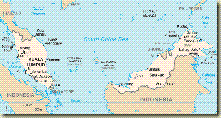 We've welcomed a good number of countries to the nuclear family, enough by now to think we've filled in our entire stamp book (well, except for Vanuatu - they seem more like hydro people - nice stamps, though).
We've welcomed a good number of countries to the nuclear family, enough by now to think we've filled in our entire stamp book (well, except for Vanuatu - they seem more like hydro people - nice stamps, though).
Now, there's Malaysia, a country split between the mainland and an island it shares with Indonesia, with the South China Sea between the halves. Malaysia is multi-cultural (though mostly ethnically Malay, at about 60%) and multi-religious (although mostly Muslim, again at 60%, mostly the Malays).
Unlike the Arab countries that have taken an interest in nuclear energy, Malaysia does not seem at all motivated by Iran's activities. Instead, worries about oil predominate.
"This nuclear energy is vital following the increase in the world fuel price and our limited oil reserve. Moreover, nuclear energy is cheap and clean," [Science, Technology and Innovation minister Maximus Ongkili said.]
We can't decide which we like more: the idea of a Science, Technology and Innovation minister (one of those in our cabinet here, please) or that his name is Maximus (one of those in our, uh, coliseum, please.)
Here's a little more:
Deputy Prime Minister Najib Razak said in June that Malaysia may consider adopting nuclear power to meet its long-term energy needs amid surging global oil prices.
Currently, half of Malaysia's power plants run on gas. Other sources include coal and hydropower.
Seems like the right idea to us. While we bridle a bit that gas prices should be moving energy policy - we fear the price fluctuations can replace good policy creation with a bipolar-like cycle of panic and neglect - we think Razak is recognizing, as some American politicians do not, that an eye on the future trumps the quick fixes of the present. Like the U.S., Malaysia has a widely dispersed population that depends on long distance hauling to keep the economy humming.
Let's keep an eye on this and see where it goes.
Map of Malaysia. Perhaps Malaysia get together with New Zealand occasionally to celebrate their divided land massedness.
Just to be fair, here's a nice roundup of Frogs of Malaysia stamps. When they build a nuclear plant, we hope the Malaysians keep those frogs safe. They're pretty unique looking.
Comments